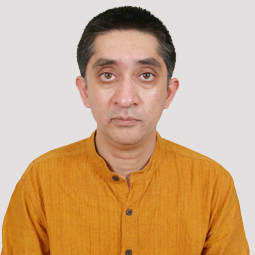
1989/B.Tech/AE Chief Scientist, CSIR- NIO INDIA
Dr Shankar Doraiswamy received his Bachelor’s in Aerospace Engineering from IIT Madras in 1989, followed by an MS in Atmospheric Sciences from the Indian Institute of Science, Bengaluru, in 1991. He was a Quick Hire Fellow and then Junior Scientist at the Centre for Mathematical Modelling and Computer Simulation, Bengaluru, between 1991 and 1995. Dr Shankar has since been a scientist at the CSIR National Institute of Oceanography, Goa, from 1995 till now. He also obtained his PhD in Marine Science from Goa University in 2000.
His current research areas broadly include Tropical Ocean Dynamics, Coupling Oceanography and Fisheries, Air-Sea Interaction, and Hydrology. In his contributions to the physical oceanography of the North Indian Ocean (NIO), he has addressed problems in ocean dynamics using simple models, providing elegant, yet quantitative, explanations for the observed circulation. In all his studies, one can see a blend of observation and theory, a combination of data and quantitative earth-system-science. This blend of observations, physics, and simple models makes his work unique in India.
Dr Shankar played a crucial role in setting up a project he currently leads, under which moorings equipped with acoustic Doppler current profilers were deployed off the Indian east and west coasts. The results of this project demonstrate that it is necessary to model the circulation in the entire basin even to simulate the currents off, say, Goa. This result has implications for environmental impact assessments in the coastal zone.
Shankar has applied his insight into tropical ocean dynamics to climate and the ecosystem response to the monsoonal forcing. Shankar played a significant role in formulating the ocean components of the Arabian Sea Monsoon Experiment (ARMEX) and the Continental Tropical Convergence Zone (CTCZ) programme and. He led some of the cruises. The results of ARMEX and CTCZ emphasize that the ocean plays an active role in the air-sea interaction in our region. Ocean dynamics also plays a major in determining the nature of the fisheries along the Indian coast. Shankar and his colleagues have shown that the physical forcing can explain some key observations: the dominance of planktivorous fish like sardines off Kerala and of carnivorous fish like Bombay Duck of Gujarat, the lower productivity of the central west coast of India compared to Kerala, and the change from sardine dominance off Kerala to mackerel dominance off Karnataka and Goa. Shankar continues to apply his insights into ocean dynamics and is currently part of a trans-disciplinary project linking oceanic processes and fisheries.
He received the Shanti Swarup Bhatnagar Prize for science and technology for 2011 in the Earth Sciences category for his contribution to our understanding of the dynamics of the Indian Ocean. in 2019, he received the National Award for Ocean Science and Technology awarded by the Ministry of Earth Sciences, India.
For his achievements in the field of oceanography and his contributions to its research in India, IIT Madras and its alumni are proud to bestow the Distinguished Alumni Award for the year 2022 upon Dr Shankar Doraiswamy.